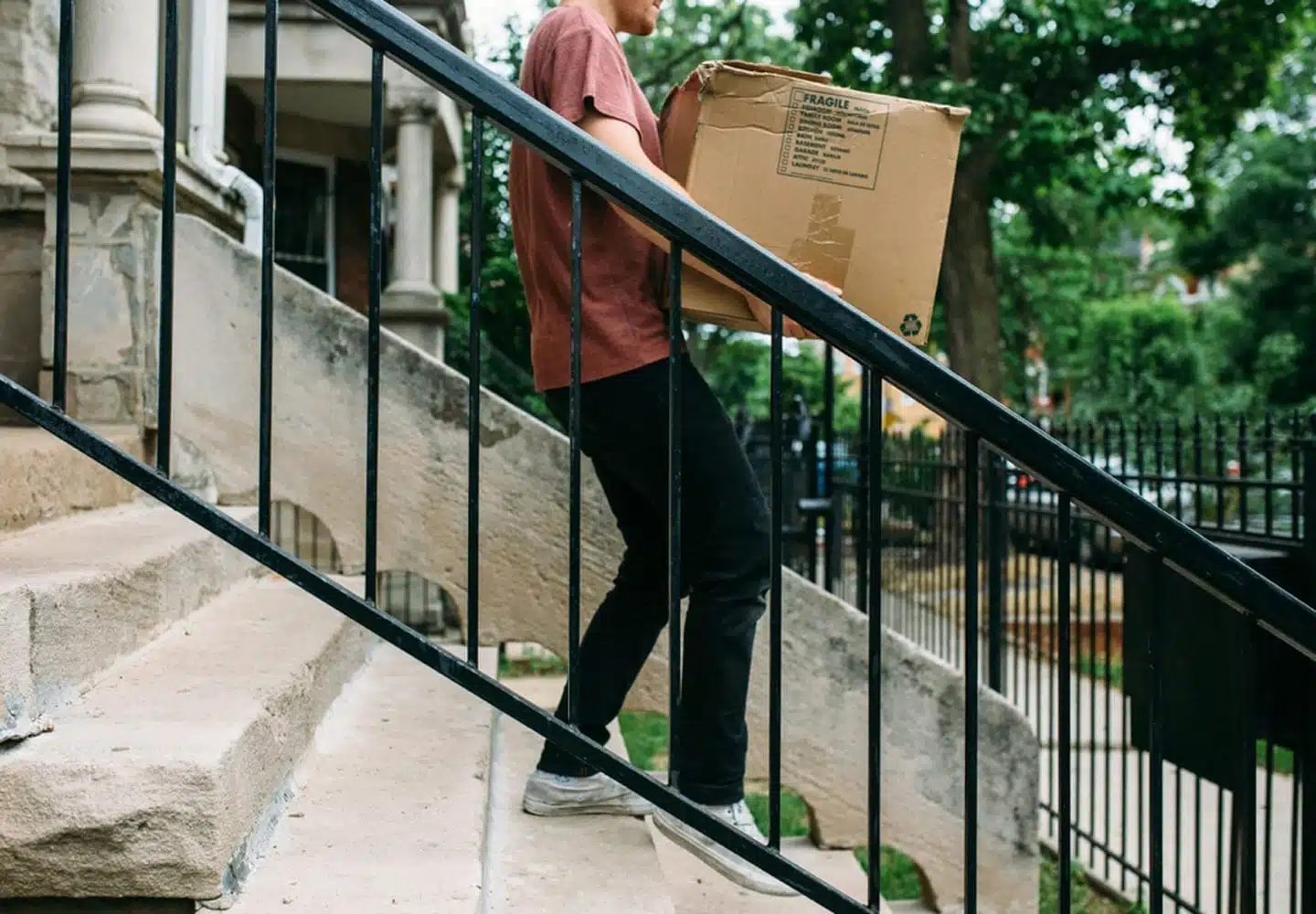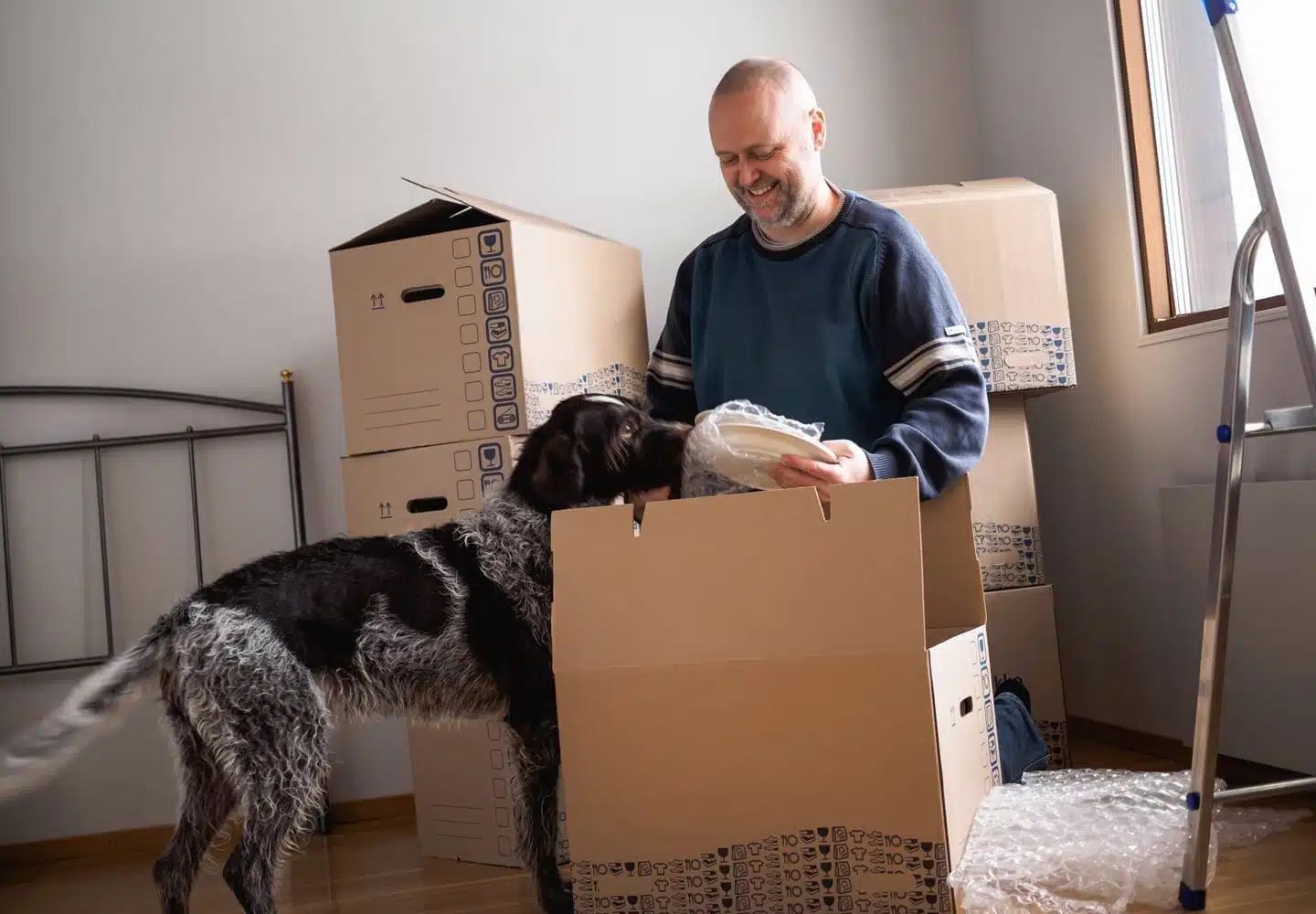In a Relationship? These Are the Questions To Ask Before Moving In Together
Moving Tips and Hacks

Realistically, regardless of your particular situation, moving in with someone you’ve never lived with before can be tough. The logistics alone require trust, communication, and a healthy heap of patience, not to mention the emotional aspects involved.
Yes, it will be a new — albeit challenging — experience, but there’s no need to fret. By implementing a few tried-and-true suggestions, the excitement you’re feeling now can stay front and center and outshine any small frustrations or bouts of impatience along the way.
How Soon Is Too Soon To Move In Together?
We’re moving and storage experts, not relationship counselors, so we’re hesitant to answer this one. However, people often ask things like, “How long is the average couple together before moving in?” or “Am I making the right decision?,” so we feel compelled to weigh in for the sake of a harmonious moving experience (which we do know a lot about).
According to experts, being ready to move in together has less to do with time and more to do with feelings and honest conversations. If you both agree that you’re ready to take your relationship to the next level, and you both are aligned in what you want out of the relationship, it’s time to start the discussion. As another relationship-focused post on the PODS Blog says, “Decide, rather than slide, into moving in together.” With that in mind, here are some things to discuss before moving in together to ensure you’re both on the same page.
Questions To Ask Before Moving In Together
Before you start gathering your moving supplies, take some time to develop a plan of action. After all, the last thing you want is to start off your new life together with a frustrating, fly-by-the-seat-of-your-pants moving ordeal.
By asking each other these questions before moving in together — and being honest about the answers — you’ll be able to enjoy the entire experience without any unpleasant surprises. Ok, maybe the first time you hear them belt out their favorite shower soprano solo, it’s a little unexpected, but you can live with that one (we suggest headphones).
1. When Do You Want To Move?
This can probably go without saying, but you’ll both need to decide when you want to move and make sure you’re giving each other enough time to make arrangements, let current roommates know, pack, etc.
Want some extra moving-in-together advice? Don’t rush the process or wait until the last minute. Start planning and getting things ready as soon as you make the decision that you’re moving in together. This cuts back on unnecessary stress, which can greatly affect your overall moving experience and maybe even your relationship.
How much time do you need to move out of your current place? If one of you is selling a house, this could take eight weeks or longer. However, if you’re renting, your leases are up, and you’ve found a new place to live, you could be prepared to move in about three to four weeks. Here’s a checklist to show how it could work:
Before Moving In Together Checklist
Four Weeks Out:
- Schedule your moving service
- Purchase moving supplies
- Purge your belongings
- Take or note measurements of your new place
Three Weeks Out:
- Start packing the items you don’t regularly use
- Donate or sell unwanted items
- Start purchasing items for your new place
Two Weeks Out:
- Keep up your packing progress
- Double check all real estate paperwork to confirm dates
- Fill out a change of address form with the Post Office
- Contact your insurance provider if you need to purchase or transfer homeowners or renters insurance
One Week Out:
- Confirm details with the moving company
- Finalize packing
- Schedule setup of internet and utilities at your new place (if necessary)
- Pack a bag with a day or two of essentials, so you don’t have to shuffle through moving boxes to find your most needed things
Moving Day:
- Go through all drawers, cabinets, etc., to make sure they’re empty
- Load your items into a moving truck or container carefully
- When unloading, check your things carefully and note any possible damage

2. What’s the Budget and Who’s Paying for What?
Discussing finances can be difficult and uncomfortable, but being proactive about the conversation can prevent even tougher conversations down the road. It’s important to get on the same page now, so no one feels taken advantage of later.
Moving can be costly — often more costly than people expect — so create a budget now and decide how to divide and conquer. From getting boxes to buying a new coffee maker to renting a portable storage unit, you should try to consider and prepare for all possible scenarios that may pop up — and figure out how you’ll divide up the final bill.
To get an idea of moving expenses, first decide if you need to buy any big-ticket items or hire any extra help for the move. Establish priorities and non-negotiables with your partner, and make a plan regarding how these will be financially covered. Having clear communication on needs, expectations, and money will save your relationship during a stressful move and beyond.
Beyond the move, plan for how you will share your weekly and monthly bills. Will you split the rent down the middle or by room size? Or will someone take care of all the rent while the other pays for food and utilities? There’s no one-size-fits-all here, so communicate with each other and work out a solution that’s good for both of you and then stick to it.
Also, one more piece of advice that you may not want to hear: You need to plan for the unexpected. Yes, this can mean damages or issues with your new place, but it can also mean breaking up. What happens to your new place if you’re no longer together? How will any financial implications be handled? No, this isn’t a fun conversation, but it could prevent a very challenging situation down the road.
| Q: How do you discuss finances before moving in together? A: For starters, just having the discussion puts you ahead of many other couples. Talking about money can be challenging, so give each other grace for broaching the subject. Topics you should cover include financial status and history, legal responsibility for the house/apartment, separate vs. joint accounts, household payment responsibility, and long-term financial goals. |
3. Are Both of You Willing To Compromise? Does That Compromise Apply to Chores?
Remember that both of you will need to feel at home in the new place and make it your own, so when deciding on those things you need to make a space work for you, consider also what your new roomie needs.
Learn to pick your battles and realize there are more important things to this process (and to life!) than fighting over a pillow you don’t like but that may hold sentimental value for the other person.
Some of the things you do want to have a frank discussion over? Splitting the chores.
For example, you might like to let the dishes pile up in the sink and then do them all at one time. That might drive your partner up the wall. And your partner may like doing laundry once a week, but you keep up with your dirty clothes pile every other day at least.
To make your situation as amicable and seamless as possible, set expectations up front. This is not the time to sugarcoat things — be totally honest with each other and go from there. If there’s a chore that you don’t mind doing that the other hates, take it on as part of your weekly duties and pass on a chore that you would rather not do. Similarly, if you both dread laundry day, perhaps take turns doing it each week (and decide on a day of the week to do it). By creating a list of responsibilities, nobody will be shorted or have too much on their plate.
And finally, be open-minded. We all have different definitions of “normal” and often don’t know what really is normal to somebody until we’ve lived in their home. Some traits you may find quirky and fun — maybe they love to feed the birds every morning like Snow White. And some, not so much (hello, unmade beds). Respect each other’s space and keep the communication flowing.

4. What Are the Household Rules?
Similar to finances, talking about rules isn’t the most fun topic for two people who are in love and ready to move in together, but setting some ground rules now can help keep things copacetic in the long run. You — an early bird — don’t want to find out that your partner is a night owl on your first night in your new place, do you?
You may not know where to begin when it comes to establishing household rules, so a good idea is to tell your partner about a typical day in your current home. What time do you wake up? What time do you like to go to bed? What do you like to do when you first get home from work? How often do you cook versus dining out? Go through a normal day, and you’ll soon spot some differences that may surprise you. Note those differences, then come up with a list of guidelines, like:
- To keep finances under control, we’ll only splurge on takeout once a week.
- So everyone gets a good night’s sleep, we’ll turn the TVs off at 10:30 p.m.
- The last person out the door is responsible for locking doors, closing windows, and turning off appliances.
- The first person who arrives home in the evening is responsible for checking the mail, collecting packages, etc.
- Make each other aware a few days in advance if guests are coming into town so preparations can be made.
| Q: Do things change when you move in together? A: Inevitably, yes. But to make the transition as smooth as possible, you need some good communication. For example, make sure you agree on how you will share your appliances, the big items each of you will bring into the new space, and the items that are non-negotiable. If you make sure the expectations are clear for both parties from the get-go, you’re likely to avoid arguments (and resentment later). |
5. What Can Each of You Do Without?
Don’t even think about combining your things with someone else’s before applying the whole Marie Kondo method to your belongings — unless you’re a fan of packing things twice, that is (once to move and once more to get rid of). Get rid of everything that doesn’t serve a purpose, is in bad shape, or just doesn’t “spark joy” anymore.
Be sure to only bring things you still love and use into this already complicated situation so, when you need to negotiate with your new housemate, it will be worth it. The last thing you need in this equation is extra clutter!

6. Do You Already Have a Decor Theme In Mind? Does Your Roomie?
Remember that thing we said about compromise? You may have a style you love, but so does your partner (and chances are, those preferences differ somewhat), so mix your decor in a purposeful way that makes you both feel seen and heard. After all, you don’t want your new home to look like the equivalent of a random donation bin somewhere. Sit down and make a plan detailing how you want to integrate your things and what makes the most sense when it comes to deciding whose couch or desk stays (unless you have a place for both).
If one of you is moving into the other’s home, you’ll want to come to an agreement on how you would update decorations, if at all. That space will be home to both of you moving forward, so you’ll need to be sure both of your personal styles are expressed and you are comfortable living there.
| Pro Tip: Don’t forget to check and confirm furniture measurements to make sure whatever you plan to bring into the new place will actually fit! |
7. What Is Each Person Bringing to the New Place?
Keeping track of things is already complicated with a move, but it’s especially tough if you don’t communicate beforehand about who’s bringing which items. To prevent unpacking two coffee makers, three TVs, and a whole host of flatware, make a home inventory checklist before moving in together and decide who is bringing what item. Once you’re ready to pack, clearly label your boxes, so unpacking is a breeze.
While you’re packing up, make sure to read our packing hacks for your upcoming move and all the other useful tips we have on the PODS Blog.

8. How Are You Going To Make the Move?
This may not be on your radar yet, but one of the most important questions to ask before moving in together is about the move itself. How are you going to get from point A to point B? It’s time to collectively make a plan!
A portable moving and storage container can be a lifesaver before, during, and after a move. Unlike a regular truck (or asking a friend to help you put stuff in their car), you can use a mobile moving and storage container for as long as you need it. It can also act as a sorting station while you go through your boxes, so you don’t have to cram everything inside your new space all at once.
Moving can be complicated enough without the addition of combining two households. But luckily, complex moves are a PODS specialty. Take advantage of the flexibility of PODS portable moving containers by combining your and your partner’s things into one moving container and having everything delivered to your new home at once.
It’s easy: Schedule your PODS container to be delivered to the first person’s home and load it up on your own time. Then, have the half-full container delivered to the second person’s home and do the same thing. Finally, have the now-full container sent to your new home together, and voila! Move complete, all in one convenient package.
See you in your new place!
Ivonne Spinoza is a freelance writer and a frequent contributor to the PODS Blog. Her work has appeared in Matador Network, PBS’ Independent Lens, and The Chicago Tribune, among others. When she’s not snuggling her cats, she’s either Kondo-ing someone’s life or fighting jet lag at some airport.

Your quote in 60 seconds
Get pricing tailored to your needs!








